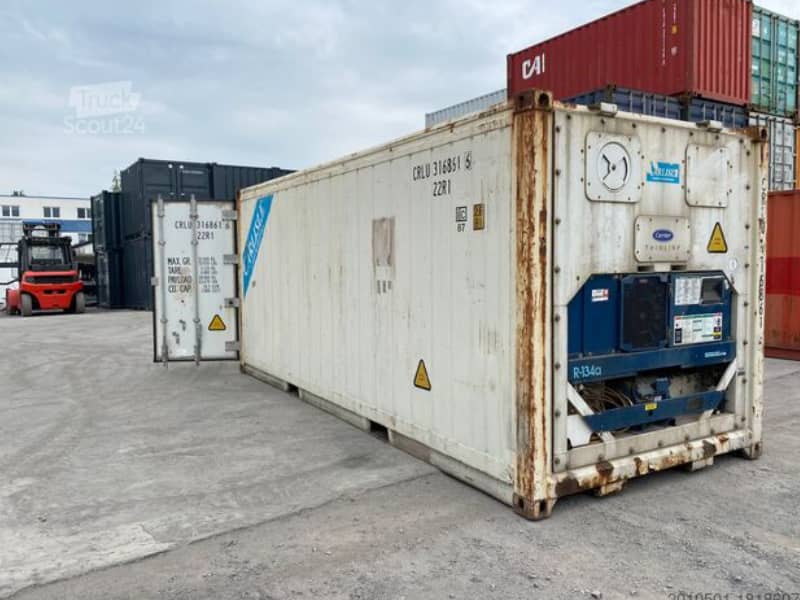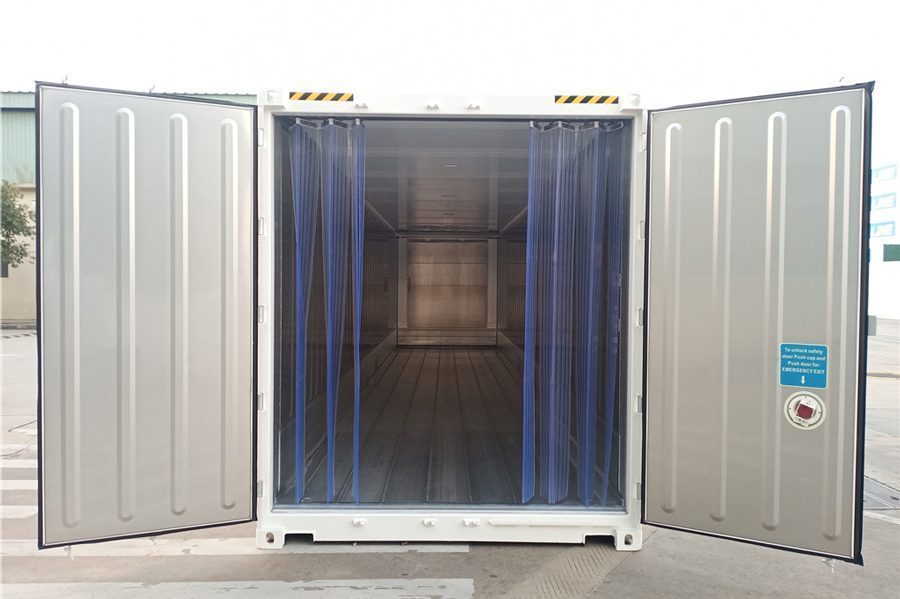Everything About Cold Store Containers: Necessary Insights for Your Storage Needs
Cold store containers play an important duty in the conservation of disposable goods. They can be found in different kinds, including refrigerated and shielded systems, each developed for certain storage space needs. Recognizing the advantages and crucial attributes of these containers is vital for businesses intending to optimize their procedures. As the demand for effective storage options grows, exploring the different choices readily available can bring about notified choices that influence both productivity and sustainability. What elements should one take into consideration when choosing the appropriate container?
Kinds of Cold Storage Containers
Cold storage containers been available in numerous kinds, each designed to meet particular temperature level control demands. Amongst one of the most common types are cooled containers, which maintain temperature levels between 0 ° C to 10 ° C, making them appropriate for disposable products like fruits, veggies, and milk products. One more type is the deep freezer container, which operates at temperatures below -18 ° C, suitable for long-lasting storage space of frozen things such as meats and seafood.
Shielded containers offer temperature stability without active air conditioning, making them beneficial for short-term transportation of temperature-sensitive items. In addition, there are mobile chilly storage units, which offer flexibility in areas and are frequently utilized in events or seasonal procedures. Blast chillers rapidly lower the temperature level of hot foods, ensuring safety and security and high quality. Each type offers a special purpose in numerous markets, from food service to drugs, highlighting the significance of choosing the ideal container for certain storage needs.

Benefits of Making Use Of Cold Store Solutions

Chilly storage space options extend the rack life of items, lowering waste and boosting profitability for organizations. By efficiently taking care of supply with appropriate temperature control, business can optimize their supply chains and improve functional effectiveness.
In addition, freezer facilities enable flexible storage space options, fitting numerous volume requirements and seasonal fluctuations sought after (used 40ft refrigerated shipping containers). This adaptability assists businesses respond swiftly to market changes
Last but not least, employing chilly storage space services can assure compliance with health and wellness policies, securing both customers and organizations. Overall, the calculated use chilly storage space improves product monitoring while promoting sustainability and economic practicality.
Key Functions to Look for in Cold Storage Containers
When choosing chilly storage space containers, numerous crucial features benefit cautious consideration to protect peak performance and reliability. First, temperature control abilities are vital; containers must preserve regular temperature levels suitable for certain items. Insulation quality additionally plays a substantial role, as premium insulation minimizes energy consumption and enhances temperature level stability.
Next, convenience of accessibility and loading is important; containers must provide straightforward layouts for effective handling and organization. Resilience is another vital aspect; weather-resistant products assure long life and protect contents versus ecological elements.
In addition, wheelchair functions, such as integrated wheels or lifting factors, help with transportation, while adjustable formats allow for customized storage space remedies.
Checking systems, including temperature level alarms and remote monitoring, offer real-time updates, making particular that conditions continue to be optimal. By focusing on these features, users can pick cold store containers that meet their functional demands successfully.
Picking the Right Freezer Container for Your Demands
Choosing the best cool storage container requires a thoughtful analysis of operational needs and specific requirements. Factors such as the kind of products being kept, temperature sensitivity, and volume must be focused on. For circumstances, disposable food products might demand containers with stringent temperature controls, while pharmaceuticals might need specific problems to maintain efficiency.
Additionally, prospective individuals need to consider the container's dimension and mobility. A bigger device might be essential for mass storage space, while smaller, portable choices might be suitable for on-site or short-term demands. Insulation high quality and power effectiveness are also critical, as these will impact operational prices and temperature level security.
Compliance with industry laws and requirements is necessary, especially in sectors like food and healthcare. By meticulously reviewing these facets, individuals can select a chilly storage space container that properly satisfies their distinct requirements and warranties ideal storage problems.
Best Practices for Maintaining Freezer Conditions
Keeping suitable cold store conditions is crucial for protecting the quality and safety and security of temperature-sensitive items. Consistently checking temperature and moisture levels is important; using reliable digital thermostats and hygrometers can offer exact readings. Moreover, proper insulation of freezer containers assists decrease temperature changes and energy loss.
Implementing a first-in, first-out (FIFO) system ensures that older supply is used prior to more recent stock, minimizing waste (used 40ft refrigerated shipping containers). Additionally, preserving an arranged layout within the storage area enables much better air movement and minimizes the threat of cross-contamination
Routine maintenance examine devices, such as compressors and seals, are crucial to avoid malfunctions. Staff training on best techniques for loading and unloading items assists maintain temperature integrity. Lastly, maintaining doors shut as long as feasible restrictions warm exchange, assuring that the cool storage environment remains stable and efficient in protecting useful items.
Price Factors To Consider for Cold Store Solutions
When examining chilly storage space here services, it is necessary to take into consideration the first investment costs alongside continuous operational expenditures. An extensive break down of these costs can disclose considerable long-lasting savings possibility for services. Comprehending these economic facets assists stakeholders make informed choices regarding their cold store requirements.

Initial Financial Investment Expenses
The monetary landscape of chilly storage containers presents different preliminary investment costs that companies should consider. These costs commonly include the acquisition or rental price of the containers, which can vary based on type, dimension, and insulation high quality. Additionally, expenses associated with retrofitting existing frameworks to fit cold store needs to be factored in, specifically if specialized devices is required. Installation prices, consisting of electric job and refrigeration systems, likewise add to the total preliminary investment. Organizations need to not overlook transportation prices for providing containers to their wanted area. Prospective customization alternatives, such as shelving or temperature monitoring systems, can additionally impact the first financial outlay. Mindful budgeting for these elements is important for effective cold store execution.
Operational Expenditures Malfunction
Functional expenses for freezer remedies encompass numerous crucial price considerations that services should browse. Trick factors include power costs, which can be considerable as a result of the need to preserve reduced temperatures. Maintenance costs are additionally significant, as regular maintenance is important to assure tools operates successfully and remains compliant with health and wellness criteria. Additionally, labor costs may develop from the demand for specialized personnel to monitor the storage and handle atmosphere. Insurance costs are one more factor to consider, as business need to shield their financial investments versus potential losses. Any kind of potential governing conformity costs should be factored in, as services may need to invest in systems that stick to food safety and security and ecological laws. Recognizing these expenditures is crucial for effective budgeting.
Long-Term Financial Savings Possible
Buying cold store services provides significant lasting financial savings possibility, changing initial expenditures right into economic effectiveness in time. By reducing spoilage and waste, organizations can improve their revenue margins significantly. Advanced insulation and energy-efficient systems reduce energy expenses, which accumulate over the life-span of the devices. Chilly storage containers usually need less frequent upkeep compared to traditional refrigeration techniques, leading to lower repair service costs. The capacity to store items for extended periods without compromising top quality enables services to profit from market variations, optimizing profits. Additionally, the scalability of freezer solutions allows firms to adapt to altering needs without sustaining excessive expenses. Overall, these variables add to a compelling situation for cold store as a cost-efficient financial investment method.
Often Asked Inquiries
The Length Of Time Can Food Be Kept in Cold Storage Space Containers?
The period food can be saved in cold storage containers varies by type. Normally, disposable items last from days to weeks, while frozen foods can stay secure for months, relying on proper temperature and storage space problems.
Are Cold Store Containers Energy-Efficient?
The power effectiveness of freezer containers varies based upon layout and insulation top quality. Modern devices often utilize advanced innovation to lessen power usage, inevitably adding to reduced operational prices and ecological influence in lasting use.
Can Cold Store Containers Be Personalized for Certain Requirements?
Freezer containers can certainly be personalized to satisfy certain requirements. Adjustments may consist of temperature level controls, size modifications, and extra features, allowing customers to customize services effectively for numerous storage space demands and operational preferences.
What Are the Usual Dimensions of Cold Storage Space Containers?
Cold store containers usually are available in conventional sizes such as 10, 20, and 40 feet. These measurements fit different storage needs, making certain adaptability for services requiring temperature-controlled environments for subject to spoiling goods or delicate materials.
Do Cold Store Containers Require Special Authorizations for Use?
Freezer containers commonly need unique licenses for use, relying on regional laws and planned applications. Authorities may mandate authorizations to guarantee safety and security requirements, ecological compliance, and correct operational techniques are maintained throughout their utilization.
Cold storage space containers come in different types, each created to meet certain temperature level control requirements. In addition, cool storage facilities permit for flexible storage space alternatives, accommodating different quantity needs and seasonal changes in need. Choosing the ideal cool storage container needs a thoughtful analysis of specific requirements and functional needs. The financial landscape of chilly storage space containers offers various initial financial investment costs that services have to consider. Cold storage containers can undoubtedly be tailored to meet particular requirements.